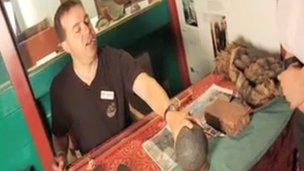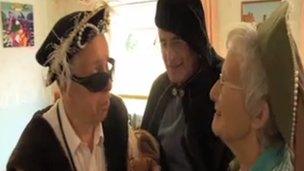Mary Rose museum helps volunteers' rehabilitation
- Published

Neil Clements gives presentations about artefacts from the Mary Rose
A Hampshire man who was seriously injured in a parachuting accident eight years ago is rebuilding his life by giving talks about the Mary Rose shipwreck.
Neil Clements, from Gosport, had been part of the Royal Navy Raiders Freefall parachute display team when a training jump went badly wrong, putting him in a coma.
As well as breaking his neck and leg and shattering his pelvis, he was left with a brain injury.
After years of intensive therapy, he is now benefitting from outreach and volunteer opportunities offered at the Mary Rose Museum in Portsmouth.
'Totally unconscious'
Talking to BBC South's Inside Out programme, he said: "The parachute collapsed at 400ft above the ground so I fell at 18mph and hit the ground and broke my neck, broke my leg, shattered my pelvis, and the crash hat I was wearing pierced my skull and gave me a brain injury.
"I was left in a coma for up to 12 weeks afterwards, totally unconscious.
"I volunteer giving presentations every Monday. It helps improve my speech and my memory - my short term memory was very bad - that has improved.
"My mobility has now improved as well. I have to travel from where I live over to here so that has helped me as well."

The museum holds outreach sessions for special needs groups and day centres
Elsewhere, outreach workers from the museum take artefacts into the community to bring the ship's history to life.
One group for visually impaired people, Open Sight, which meets in Waterlooville, spent time dressing up as Tudor characters and handling objects including pieces of timber from the 500-year-old ship.
Community engagement officer Trevor Sapey takes his Tudor roadshow to special needs groups and day centres to teach people about life in the time of Henry VIII.
'Feeling useful'
Another person whose life has been helped by the ship is former taxi driver Sam Davis.
He suffered a stroke while driving two years ago and temporarily lost his ability to speak.
He said: "I stopped the car and radio-ed through and said 'I'm sorry I can't remember where I'm going, can you help me?'
"Apparently I just switched off for five days and when I woke up I couldn't speak, I couldn't read, I couldn't do anything. I had to learn to actually speak again."
Mr Davis now works as a volunteer carpenter at the museum.
He said: "It's given me a reason to be here - without something to do on a regular basis there didn't seem much point, but I was looking for work, not necessarily for the money, just to feel useful really.
"There are a lot of people who have got something they can do if they are given the chance and fortunately now I am one of them."
You can find out more about the museum's outreach and volunteering projects by watching Inside Out on BBC One South on Monday at 19:30 GMT.
- Published5 September 2011
- Published19 February 2011